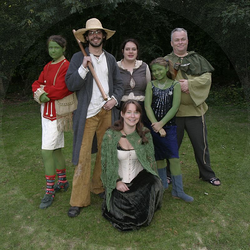Roleplaying
Roleplaying

Photo by Bifford The Youngest (retrieved on 30.09.2009)
Short description
The roleplaying method can be used in preschool, school, and adult education. An issue relevant for the group (possibly conflict-creating) is presented by having participants play relevant roles. This method should be used mainly when it goes about fostering facets of actions and taking live-action observer positions. This method can especially develop the perception, empathy, flexibility, openness, cooperation, communication, and problem-solving skills.
Process description
Preparation:
Set the subject.
Clarify the roles. Check whether each player is clear about their role.
Set observation criteria and assign the monitoring tasks.
Playtime:
Identify yourself with your role.
Perform the play without interruption. Evaluation phase
Finish your role.
Evaluate the play thoroughly.
Examples of evaluation points:
How did the players feel?
Were the roles adhered to?
Which behaviors and sentiments of the players appeared pleasing or displeasing?
Were the arguments to the point?
How were the language, facial expressions, gestures used?
Have you become aware of your own attitudes or views?
Which denouements were relevant to decision making? What quality had the decision making?
What are the implications for the future behaviour of the players?
Required resources
Text with description of the setting
Role cards
Observation sheets
Examples
This method can be utilized, for example, when forming a company. Let's assume that four friends want to start a business. They have options to create a limited partnership, general partnership, public limited company, or corporation. After students acquire enough information about the different types of business entities, they discuss the matter with each other while playing different roles. The discussion should cover respective advantages and disadvantages of each types of business entity.
At the end, a decision is made, if possible, what legal form the company should use. Finally, a the groups reflects about the roleplaying and does a repeat using different members of the group.
Comments
The roleplaying is not about the solution that ultimately emerges but about the way of arriving at that solution. Therefore, the evaluation of the roleplaying is as important as the roleplaying itself.
PSI: https://psi.methopedia.eu/learning-activity/role-playing


